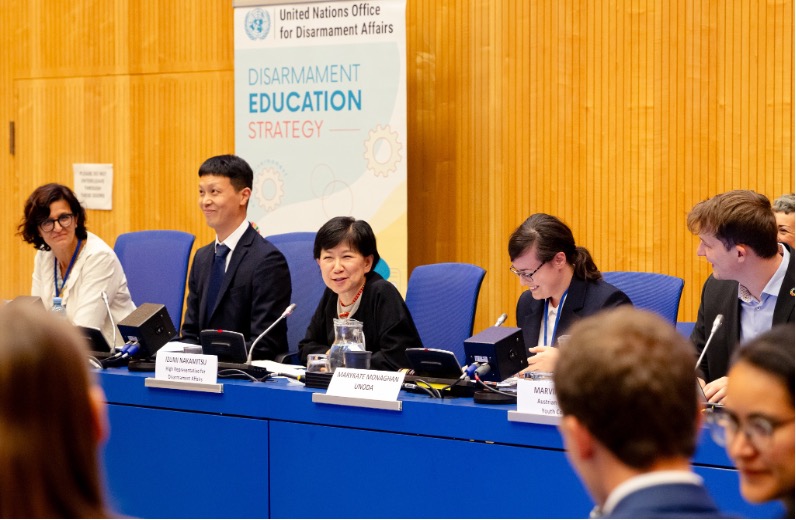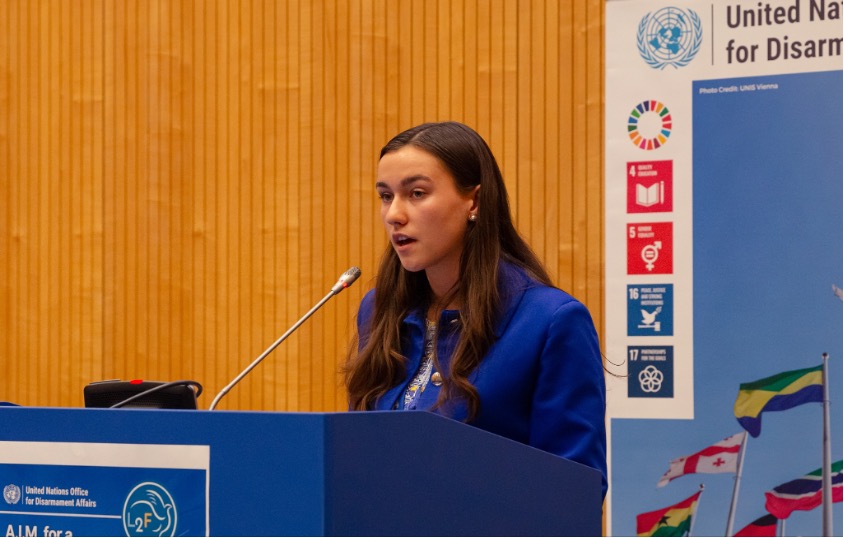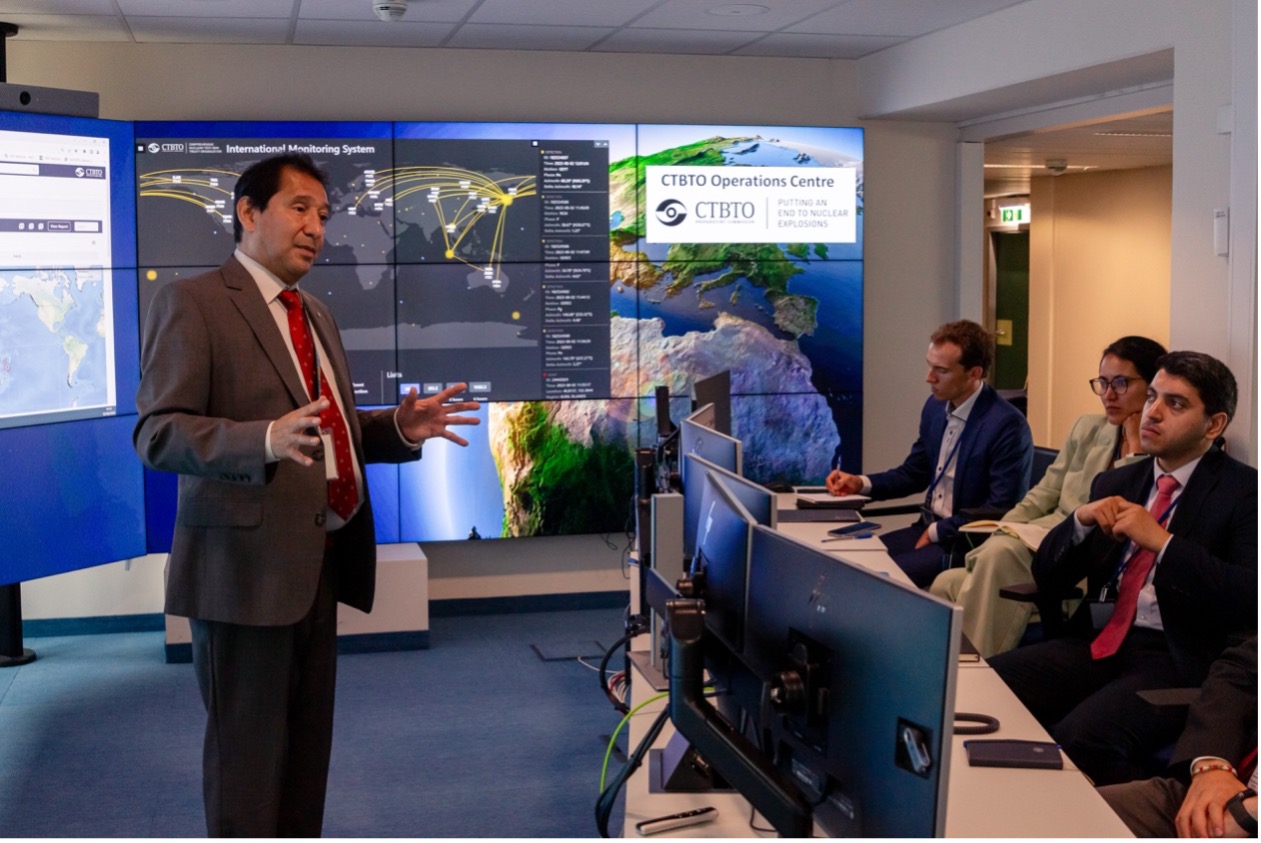Over 22 months have passed since the Russian Federation initiated its invasion of Ukraine. As Russian Armed Forces prepare to deploy tactical nuclear warheads to Belarus and occupy the largest nuclear power plant in Europe, the risk of nuclear catastrophe is exceptionally high.
Against this backdrop, States Parties to the Treaty on the Non-Proliferation of Nuclear Weapons (NPT) met to discuss the future of nuclear non-proliferation and disarmament during the first session of the Preparatory Committee for the 2026 Review Conference (NPT PrepCom) from 31 July to 11 August. Joining them, myself and nine other Leaders to the Future travelled to Vienna, Austria, to present youth insights for strengthening the nuclear non-proliferation and disarmament regime.
The side-event, entitled “A.I.M. for a Way Forward,” provided a platform for our group of ten young leaders to present recommendations on strengthening the implementation of the Treaty, particularly focusing on the linkages between disarmament and five key topics: the Secretary-General’s New Agenda for Peace, multilateralism, emerging technologies, gender parity, and diversity, equity, and inclusion. The recommendations were developed during a series of six-month consultations with a global group of young advocates, civil society, and other stakeholders, made possible with generous financial support from the Ministry of Foreign Affairs of the Republic of Korea.

As a representative of the Leaders to the Future, I called on States Parties to prioritize four critical issues during their NPT PrepCom deliberations:
- First, States parties must restore confidence in the NPT by building consensus in areas of common interest. This includes: acknowledging that nuclear power plants should not be targeted in armed conflict; expanding cooperation and capacity-building programmes to enhance nuclear safety and security; increasing investment into disarmament, non-proliferation, and arms control education.
- Second, States parties must increase access for civil society within NPT conferences, integrating them into the substantive discussions of States parties.
- Third, States parties must create space for youth participation at the national level to give a voice to the 1.2 billion young people who have proven to be key agents for social change.
- Fourth, States parties must begin serious and good-faith negotiations toward complete nuclear disarmament to ensure that Article VI does not remain a dead letter.

Nine of my fellow Leaders to the Future also presented their ideas to enhance the implementation of the NPT. Mr. Almuntaser Albalawi called for the establishment of expert groups consisting of young people and early career professionals across disarmament regimes. Mr. Philip Chennery and Ms. Mariana Roa Vargas recognized the need to bridge knowledge gaps relating to new and emerging technologies. Ms. Vanda Proskova and Mr. Santiago Yarahuan urged states to address the contribution of social and cultural biases that have influenced the underrepresentation of women in disarmament fora. Ms. Christelle Barakat and Ms. Monalisa Hazarika drew attention to the UN’s role in facilitating meaningful youth inclusion, emphasizing that equitable participation requires visa issuance assistance, paid internships, and online programming. Mr. Musa Carew and Ms. Linh Trang Phung highlighted the disarmament dimension of the Secretary-General’s New Agenda for Peace, which includes a focus on reshaping responses to violence and investing in conflict prevention.
On the margins of the NPT PrepCom, the Leaders to the Future also engaged with UN entities, Member States, civil society organizations, and other stakeholders to learn more about their contributions to the disarmament field. With Ms. Izumi Nakamitsu, the High Representative for Disarmament Affairs, we discussed the challenges of working towards a nuclear weapons-free world, as well as our experience with the Office’s youth engagement programmes. With H.E. Jarmo Viinanen of Finland, the Chair of the Preparatory Committee and Chair of the working group on further strengthening the review process of the Treaty, we examined the dynamics around and expectations for the first session.
We also increased our technical competence through briefings by the International Atomic Energy Agency (IAEA), the Comprehensive Nuclear-Test-Ban Treaty Organization (CTBTO), the Vienna Office of the UN Office for Disarmament Affairs (UNODA), the UN Office for Outer Space Affairs (UNOOSA), and the UN Office for Drugs and Crime (UNODC) Terrorism Prevention Branch. Our visit to the IAEA Laboratories in Seibersdorf provided unique insight into the Agency’s work, including safeguard analysis and nuclear applications.

Throughout the week, we connected with fellow young peace advocates from around the world. In a side-event hosted by Mayors for Peace, high school students from Hiroshima detailed their efforts to raise awareness of the 1945 atomic bombings and preserve the testimonies of hibakusha. During a youth network event, representatives of various organizations outlined opportunities for young people to contribute to the nuclear sector.
One of the most impactful sessions for me was a briefing by an IAEA representative who visited the Zaporizhzhia nuclear power plant in Ukraine. He shared troubling insights into the conditions of the plant under Russian occupation, including recurrent power outages, the installation of anti-personnel mines, restriction of movement for workers, and dangerous passage through conflict zones.
The Russian Federation’s aggression in Ukraine remains one of the biggest threats to international peace and security. As geopolitical tensions and nuclear risk continue to rise, young people have a duty to educate themselves on the risk of nuclear catastrophe and help create solutions to achieve and safeguard international peace and security
Thank you, H.R. Izumi Nakamitsu, UNODA, and Youth4Disarmament for recognizing the significance of youth empowerment. Thank you, Ms. Marykate Monaghan, Ms. Soo Hyun Kim, Ms. Radha Day, Ms. Rebecca Jovin, and Ms. Alexandra Kiss for equipping the next generation of leaders with the skills necessary to address these challenges.
About the author - Sofia Polishchuk
Sofia Polishchuk studies national security and foreign relations law at the George Washington University Law School in Washington, D.C. She is a political and cyber affairs intern for the Permanent Mission of Ukraine to the United Nations, as well as the director of the Children of Ukraine Foundation. She currently acts as one of the UN Office for Disarmament Affairs’ Leaders to the Future, following her role as one of the Leaders for Tomorrow in 2022.
Disclaimer: Spotlight Stories submitted by the #Youth4Disarmament community are not official publications of the United Nations. The stories provide a platform for youth to share their opinions and reflect on their experiences in the disarmament field. The views expressed are those of the author, and the publication of the Spotlight Stories does not imply an endorsement of the views expressed nor that the material is accurate or without bias.